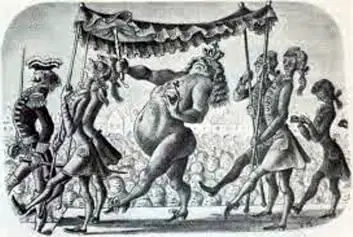The label given to any fictional item that viewers have been induced into believing as real.
The emperor’s new clothes
What's the meaning of the phrase 'The emperor's new clothes'?
What's the origin of the phrase 'The emperor's new clothes'?
The expression ‘the emperor’s new clothes’ or variants like ‘the emperor has no clothes’ are difficult to explain briefly and are most easily understood by looking at its source, that is, Hans Christian Anderson’s fable The Emperor’s New Clothes, 1837.
Anderson’s tale involves a vain king who was preoccupied with his appearance and his wardrobe. A pair of swindlers took advantage of this by pretending to be able to weave the finest cloth, which couldn’t be seen by people who were either unfit for office or were particularly stupid. The king decided to have a suit of clothes made from the fabric in order to test which of his courtiers was unfit for office. As he didn’t want to appear stupid or unfit for rule himself, he pretended to be able to see the new clothes, as did all of his courtiers. He paraded the ‘new clothes’ through the streets and the onlookers, also not wishing to appear stupid, all admired them. A small child, who didn’t understand the apparent necessity for pretence, piped up ‘But he has nothing on!’. The bubble of pretence burst and soon all the onlookers were repeating what the child had said, whilst the king continued the procession, attempting to maintain his dignity by pretending that nothing had happened.
So, the meaning of the expression is clear from the story. It is used in contexts where people are widely acclaimed and admired but where others question whether what they have created is of any value. Modern-day examples might be the highly priced work of conceptual artists or the more avant-guard products of fashion designers.
The phrase bears some similarity to another modern-day expression – the elephant in the room. An essential factor with both phrases is the willingness of people to engage into an unspoken contract to willfully disbelieve what they know to be true.
The history of “The emperor ‘s new clothes” in printed materials
Trend of the emperor ‘s new clothes in printed material over time
Browse more Phrases
About the Author

Phrases & Meanings
A-Z
A B C D E F G H I J K L M N O P Q R S T UV W XYZ
Categories
American Animals Australian Bible Body Colour Conflict Death Devil Dogs Emotions Euphemism Family Fashion Food French Horses ‘Jack’ Luck Money Military Music Names Nature Nautical Numbers Politics Religion Shakespeare Stupidity Entertainment Weather Women Work
How did we do?
Have you spotted something that needs updated on this page? We review all feedback we receive to ensure that we provide the most accurate and up to date information on phrases.
